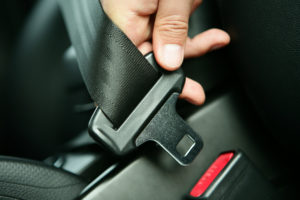
You need to know how liability is determined in Decatur, GA, personal injury cases if you have a pending claim or lawsuit. Although you might feel strongly that the at-fault party should cover the costs of your injuries and other financial losses, the judge or jury must see evidence of all four elements of negligence before determining if liability belongs to the opposing party.
You will not have to take a crash course in law if you have a Decatur personal injury lawyer handle your lawsuit. Instead of stressing about whether you did everything you were supposed to and met every deadline, you can sit back and focus on your health and well-being while we do the heavy lifting and take legal action on your case.
The First Element of Liability: Duty of Care
When you pursue a personal injury lawsuit for compensation because of someone else’s carelessness in Decatur, you must first show the at-fault party owed you a duty of care. Let’s illustrate this and the other elements of liability with a hypothetical car accident case.
As the American Bar Association (ABA) explains, every driver has a duty to drive carefully whenever they are on the road. For example, people operating motor vehicles on public streets are legally obligated to obey road rules and devote their full attention to driving.
For a free legal consultation, call (404) 888-8888
Personal Injury FAQs
Can I Pursue Punitive Damages in My Atlanta Personal Injury Case?What Types of Personal Injury Cases Are Common in Atlanta?How is Liability Determined in Atlanta Personal Injury Cases?How Can I Protect My Rights When Dealing with Insurance Adjusters in Atlanta?When Should I Hire a Decatur Personal Injury Lawyer?What’s the Statute of Limitations for Personal Injury Claims in Decatur?The Second Element of Liability: Breach of Duty
When a person’s actions or inactions do not hold up their duty of care, they have breached it. Violating this legal duty is automatically negligent.
In the context of a car crash, a driver could breach their duty of care by speeding, driving while distracted or impaired, or exhibiting other acts of carelessness. Negligence alone is not enough, however, to make a person liable. If it was, someone could sue us whenever we drive over the speed limit.
The Third Element of Liability: Causation
The negligent act must directly cause the car crash that injured someone. If something else caused the collision, the injured person must look to that party for compensation.
Let’s say you got hurt in a car accident in Decatur, GA, by a drowsy driver who fell asleep at the wheel. It was a three-vehicle crash that included a drunk driver. If the drunk driver did not directly cause or contribute to the accident, they likely won’t be held financially accountable to the injured person, even though they could face criminal charges for driving while impaired.
In this situation, the injured person can pursue the drowsy driver because that driver caused the accident by breaching their duty to be alert when driving.
Complete a Free Case Evaluation form now
The Fourth Element of Liability: Measurable Losses
Like basketball, the law sometimes follows the principle of “no harm, no foul.” In other words, if you had a terrifying near-miss but somehow escaped unscathed, you are unlikely to have quantifiable damages. The law usually requires measurable losses for a person to recover compensation in personal injury cases.
A person who suffers physical injuries, however, can go after the at-fault party for monetary compensation when they can also prove the first three elements of liability. Physical wounds satisfy the fourth requirement of measurable losses.
Click to contact our personal injury lawyers today
Recoverable Damages After Establishing Liability in a Decatur Personal Injury Case
After you satisfy all four factors demonstrating the opposing party’s negligent actions, you can hold the defendant accountable for your losses, which can include the following:
- Lost income. If you could not work while recuperating from your wounds and received medical interventions like surgery and missed paychecks during that time, you could include damages for lost income in your injury claim
- Future lost income. After a severe injury, a person might not be able to make as much income as before. They might have chronic pain, loss of function, or other challenges that affect their ability to work for a living.
- Medical bills. The initial and follow-up or ongoing medical treatment is typically compensable. This category includes the ambulance, emergency room, doctor, hospital, surgery, prescription drugs, and physical therapy.
- Long-term care. After a catastrophic injury like life-changing head trauma or spinal cord damage, a person might lose the option of living independently. They might need daily help with medical treatment and personal care because of their wounds.
- Pain and suffering. This category of damages covers damages that do not have a measurable dollar amount. The pain, discomfort, and emotional trauma someone experiences from an injury are pain and suffering damages. Other damages can include mental anguish, emotional distress, loss of consortium, loss of enjoyment of life, and more.
- Other intangible losses. A person might have a claim for compensation for other damages like chronic depression, post-traumatic stress disorder (PTSD), or disfigurement after getting injured.
If your loved one died from their injuries in an accident that someone else caused, the family might be able to go after additional compensation for their losses.
How Georgia’s Statute of Limitations Affects Your Decatur Negligence Case
Even if you can establish the defendant’s liability for your losses, you must track your time, or you could lose your right to seek financial compensation. Georgia has a filing deadline, also called the statute of limitations, for filing lawsuits. Different types of lawsuits have different deadlines. A breach of contract claim will have a different filing deadline than a will contest.
You must file your Decatur personal injury case within two years, according to O.C.G.A. § 9-3-33. If your close relative died from wounds that would have been grounds for a personal injury case if they had survived, you must file your wrongful death lawsuit within two years under the same statute.
Why Everyone in Decatur, GA, Can Afford to Hire a Personal Injury Lawyer
You do not have to try to identify all the elements of liability or the kinds of damages available if you work with a personal injury attorney from Bader Scott Injury Lawyers. We can handle your legal matter for you.
You will not have to pay up front for legal help because we accept cases on a contingency fee basis. With this legal fee structure, we receive a percentage of the settlement proceeds or court award at the end of the case. You do not have to be wealthy to hire a personal injury lawyer to represent you.
Call Bader Scott Injury Lawyers – We Can Lead Your Decatur Injury Case
You can reach out to our personal injury team today for a free initial legal consultation. We can review the specifics of your situation and explain how legal representation could benefit your case. We can talk to the insurance carrier for you and gather case-supporting evidence to build your claim or lawsuit for maximum compensation.
Here, we have compiled a list of frequently asked questions (FAQs) about personal injury law and the financial recovery process. Call us today to get started.
Call or text (404) 888-8888 or complete a Free Case Evaluation form


